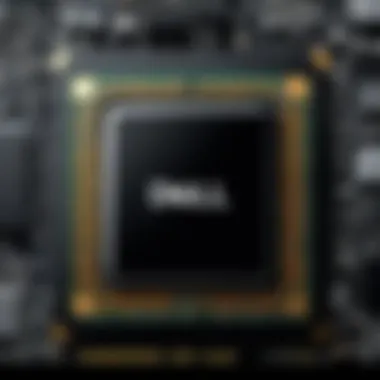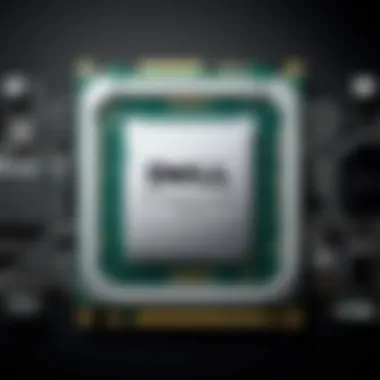In-Depth Analysis of the Dell R740 CPU Specifications


Intro
The Dell R740 CPU represents a significant advancement in server technology. This article provides a meticulous examination of its specifications, performance, and practical applications. Understanding the capabilities of the R740 CPU is essential for selecting the right hardware for various needs, whether they are enterprise-level computational tasks, gaming, or personal projects.
Product Overview
Brief Description
The Dell R740 is a robust server designed for versatility and high performance. It can support a variety of applications, from cloud computing to virtualization. Its architecture is geared towards enhancing data center efficiencies, providing users with a reliable platform to handle demanding workloads.
Key Features
Some of the critical features of the Dell R740 CPU include:
- High scalability with support for multiple processors
- Advanced security features, including TPM 2.0
- Efficient thermal management designs
- Support for various storage options, optimizing data access speed
- Integrated management tools for ease of monitoring and maintenance
Available Variants
Dell offers several variants of the R740. These allow customization based on specific needs. Users can choose from different processors, memory sizes, and storage configurations, tailoring the system to their unique requirements.
Specifications Breakdown
Technical Specifications
The Dell R740 sports a powerful architecture that supports Intel Xeon Scalable processors. It can host up to 2 CPUs, significantly boosting processing power. Key technical specifications include:
- Memory slots: Up to 16 DIMMs supporting RDIMM/LRDIMM
- Maximum RAM: Up to 3TB with Intel Xeon processors
- Storage options: 8 x 2.5” drive bays or 4 x 3.5” drive bays for HDD
Performance Metrics
Performance is a critical aspect of any CPU. The R740 delivers high efficiency, particularly in multi-threaded tasks, thanks to its support for various Intel technologies. Benchmark tests show that it performs exceptionally in virtualization and big data processing scenarios.
Compatibility Information
The Dell R740 is compatible with a wide range of software and systems. It runs on various operating systems, including Windows Server and numerous Linux distributions. This flexibility ensures that it can adapt to different business environments easily.
Comparative Analysis
Competing Products
Several products share the market with the R740, including the HPE ProLiant DL380 and Lenovo ThinkSystem SR650. Each has its features and drawbacks, appealing to different sectors of users.
Strengths and Weaknesses
Strengths of the Dell R740 include:
- Versatile configuration possibilities
- Strong performance in enterprise environments
Weaknesses might involve:
- Higher initial cost compared to some competitors
- Complex upgrade pathways for less experienced users
Price Comparison
When considering price, the R740 is positioned in the mid to high range for server CPUs. This pricing reflects its capabilities and advanced features, making it a valuable investment for serious users.
Buying Guide
Target User Profiles
The Dell R740 appeals primarily to professionals in IT, gamers looking for customized solutions, and organizations needing reliable server performance. Its adaptability makes it suitable for a variety of workloads.
Important Considerations
When purchasing, users should evaluate:
- Performance needs: Define the primary purpose (e.g., gaming, server tasks).
- Budget: Ensure that the investment aligns with financial resources.
- Future-proofing: Consider potential future upgrades before deciding on configurations.
Insider Tips for Buyers
- Compare with other models before making a decision.
- Take into account potential support costs for ongoing maintenance.
- Look for certifications and warranties that enhance peace of mind.


Maintenance and Upgrade Insights
Regular Maintenance Practices
To keep the R740 performing optimally, regular maintenance is essential. This includes:
- Cleaning dust from components regularly
- Updating firmware to the latest versions
- Monitoring system performance metrics
Upgrade Paths and Options
Users can easily upgrade components, such as memory and storage. The friendly architecture allows for smoother transitions to more powerful parts without unsettling the whole system.
Troubleshooting Common Issues
In the event of problems, common troubleshooting issues include:
- System overheating: Check cooling systems and thermal paste.
- Performance drops: Monitoring resource use to identify bottlenecks.
- Compatibility errors: Ensure all components are fully supported.
The Dell R740 CPU combines durability with advanced features, making it an ideal choice for various user needs.
Understanding these aspects can help users navigate the complexities of upgrading or purchasing their next server solution.
Prelude to the Dell R740
Understanding the Dell R740 CPU is crucial for those looking to enhance their server capabilities. The R740 model stands as a prominent figure in Dell's PowerEdge series, and its specifications, performance, and versatility offer key insights for tech enthusiasts and professionals alike. This section aims to elucidate the foundational elements of the R740, which will help readers assess its significance in a broad range of applications.
Overview of the Dell PowerEdge Series
Dell's PowerEdge series represents a comprehensive line of servers designed to meet diverse computing demands. This series includes various models, each tailored for different workloads and performance requirements. The R740, as part of this series, integrates powerful hardware configurations that cater to virtualization, data analytics, and cloud workloads.
The architecture supports multiple CPU options, allowing users to select what best suits their needs. Additionally, the design emphasizes scalability, enabling organizations to expand their capabilities as requirements grow. Users can lower operational costs while maintaining performance efficiency through the intelligent management of these systems.
With the increasing complexity of IT environments, understanding the PowerEdge series offers essential context for grasping the advancements and innovations embodied by the R740 model.
Significance of the R740 Model
The significance of the R740 model can be attributed to its multipurpose nature, reliability, and performance features. This server is equipped with Intel's latest Xeon processors, offering remarkable processing power for handling demanding applications.
Moreover, the R740's design incorporates advanced thermal management features. These help to maintain optimal operating temperatures, ensuring that the CPU can sustain peak performance without throttling. The result is a more stable and efficient system over extended periods, which is vital for business-critical applications.
The Dell R740 serves as a cornerstone for enterprises seeking to modernize their IT infrastructure. Its features and capabilities make it an optimal choice for a wide array of environments and use cases.
Furthermore, the expandability of the R740 enables businesses to adapt to changing operational needs. This includes support for additional storage and memory modules, which can be critical for growing workloads. The model represents not just an investment in current technology, but also a forward-thinking solution that anticipates future needs.
In summary, the introduction of the Dell R740 provides a necessary step toward understanding its role within the vast landscape of modern computing solutions. This foundation will help readers appreciate the detailed analysis that follows in the subsequent sections.
The Architecture of the Dell R740 CPU
The architecture of the Dell R740 CPU plays a crucial role in defining its performance and overall capability. It involves various elements that are essential for not only understanding the structure of the processor but also for evaluating its efficiency in different applications. The architecture signifies the blend of hardware and software that enables seamless operation under various workloads. It offers a glimpse into how different components interact, thus allowing users to optimize their setups accordingly.
CPU Socket Types and Compatibility
The CPU socket types are fundamental in determining the compatibility of the Dell R740 with other hardware components. Specifically, the R740 utilizes the LGA 3647 socket type, which is designed to accommodate Intel® Xeon® Scalable processors. This socket type is critical for enhancing the proper functionality of the server by ensuring that the CPU efficiently interfaces with the motherboard. The compatibility of the LGA 3647 socket with a wide range of Xeon processors provides users with the flexibility to customize their configurations based on performance needs.
When considering upgrades, it's vital to check the CPU's compatibility with existing systems. Users should also be aware that while LGA 3647 allows for multiple processor options, the choice of CPU may affect other hardware components and should align with the server's intended workload.
Chipset Specifications
Analyzing chipset specifications offers further insight into the Dell R740 CPU's capabilities. The R740 employs the Intel C620 chipset, known for its robust support of various Intel technologies. This chipset enhances the CPU's performance, especially in environments demanding uptime and reliability.
Key specifications of the Intel C620 chipset include support for up to 24 DIMM slots, enabling significant memory expansion potential. Additionally, it facilitates support for advanced features like Intel® Optane™ technology and various RAID configurations, making it suitable for enterprise-level applications. The synergy between the chipset and the CPU provides enhanced data handling capabilities, leading to improved computational efficiency and resource management.
Overall, understanding the architecture—particularly socket types and chipset specifications—enables users to make informed decisions when configuring their Dell R740 systems. Engaging deeply with these aspects ensures optimal performance and longevity of the hardware setup.
Performance Metrics
Understanding the performance metrics of the Dell R740 CPU is essential for both system administrators and enthusiasts looking to optimize their server environments. These metrics provide insight into how effectively the CPU operates, influencing both applications and overall system performance. Evaluating processing power, thermal design power (TDP), and benchmarking results can help users make informed decisions about hardware upgrades and operational capabilities.
Processing Power and Speed
The processing power and speed of a CPU are often considered crucial factors when determining system performance. The Dell R740 offers a range of processors from the Intel Xeon Scalable family. These CPUs have numerous cores, with clock speeds that vary based on the specific model chosen. Higher core counts allow the R740 to manage and process multiple threads simultaneously.


Furthermore, the clock speed directly impacts processing speed, determining how many cycles per second the CPU can execute. Users with workloads that require significant computing power, such as data analysis or virtual machine hosting, will benefit from selecting models with higher clock speeds and core counts. This results in improved responsiveness and the ability to tackle demanding tasks with greater ease.
Thermal Design Power (TDP)
Thermal Design Power is a key metric that signifies the maximum amount of heat a CPU generates under typical load conditions. For the Dell R740, understanding TDP is paramount for system stability and longevity. Managing heat effectively is critical since excessive heat can lead to system throttling, where the CPU reduces its performance to avoid overheating.
The R740 employs efficient cooling solutions to keep TDP within acceptable limits. CPUs in this range often have TDP values that can range significantly, sometimes from 75 watts to over 205 watts. Users must consider both the TDP of their chosen CPU and the overall thermal management of their servers to ensure optimal performance without damaging components. A well-planned cooling strategy not only enhances performance but can lead to longer hardware lifespans.
Benchmarks and Testing
Benchmarking provides valuable quantitative data regarding the CPU's performance under various conditions. Specific tests measure processing speed, multi-threading performance, and even power consumption. Various benchmarking tools such as PassMark or Cinebench offer detailed insights that aid in comparing the R740 against its competitors.
After running benchmarks, results typically illustrate the R740's strengths, such as its excellent multi-threaded processing capabilities thanks to its architecture. Users considering this CPU for resource-intensive applications can reference these tests to validate the performance claims made by Dell.
Key Features of the Dell R740 CPU
The Dell R740 CPU incorporates several key features that contribute significantly to its performance, efficiency, and versatility. Understanding these features is essential for anyone considering this server for enterprise deployments. The R740's architecture is built to handle various workloads, which provides great flexibility to meet unique computing needs. Each feature enhances the overall user experience and operational efficacy, making it a prime choice in many IT landscapes.
Virtualization Capabilities
Virtualization is a core functionality that many organizations rely on, and the Dell R740 CPU excels in this domain. It supports advanced virtualization technologies, allowing multiple virtual machines to run seamlessly on a single physical server. This capability is crucial for optimizing hardware resources and reducing costs.
The R740 utilizes Intel's Xeon Scalable processors, which come equipped with features such as Intel Virtualization Technology (VT-x and VT-d). This ensures enhanced performance of virtualized environments, enabling workloads to operate efficiently. The architecture also supports tools like VMware vSphere and Microsoft Hyper-V, which are widely used in data centers.
Moreover, the processor's high core count means that tasks can be processed parallelly, vastly improving the overall throughput. With features like Intel Speed Shift and Intel Turbo Boost, virtualization performance can dynamically adjust to meet workload demands, further enhancing efficiency.
Scalability Options
The ability to scale is vital for growing enterprises. The Dell R740 CPU is designed with scalability in mind, making it possible to expand resources as business needs evolve. With support for up to two processors, it offers flexibility to adopt more powerful configurations as required.
In addition to CPU scalability, the R740 accommodates a variety of memory modules. It supports DDR4 memory up to 3TB, enabling users to manage increased workloads more effectively. This flexibility ensures organizations can keep pace with their performance requirements while managing costs effectively.
Key Aspects of Scalability:
- Multiple Processor Support: Allows for dual-processor configurations.
- Memory Expansion: Capable of supporting large amounts of RAM.
- PCIe Slots: Provides options for additional add-in cards, adapting to various needs.
Energy Efficiency
Energy efficiency is a growing concern for data center operators. The Dell R740 CPU demonstrates a commitment to reducing energy consumption while maintaining high performance. It incorporates features designed to optimize power usage without compromising processing capabilities.
The thermal design power (TDP) is thoughtfully balanced, enabling operations in demanding environments without excessive heat generation. This efficiency not only prolongs the hardware's lifespan but also helps lower operational costs.
Additionally, it supports features like power capping, allowing administrators to set limits on power usage for individual servers, ensuring optimal energy consumption across the board. This focus on energy efficiency aligns with modern sustainability practices, contributing to a reduced carbon footprint.
Comparison with Competing CPUs
In the realm of server CPUs, understanding the competitive landscape is essential for making informed decisions. The comparison of the Dell R740 CPU with its competitors not only highlights its unique offerings but also showcases its place within the broader market. This analysis will focus on two key comparisons: Intel versus AMD and Dell R740 versus Dell R640. Both of these comparisons illuminate various attributes, such as performance, efficiency, and application suitability, which are fundamental for potential buyers.
Intel vs.
AMD
When examining the CPU choices for the Dell R740, the Intel versus AMD debate becomes significant. Traditionally, Intel has dominated the server market, emphasizing stability and a mature architecture. The latest Intel Xeon Scalable processors deliver strong performance, especially in single-threaded tasks. However, AMD has made substantial advancements with its EPYC series, offering higher core counts and better multi-threaded performance. This is vital for workloads requiring extensive parallel processing.
Key considerations:
- Performance: Intel CPUs are often seen as slightly better for tasks that require higher clock speeds, while AMD shines in heavy multi-threaded applications.
- Cost: AMD EPYC processors typically provide more cores per dollar, which can be attractive for organizations needing to maximize their return on investment.
- Compatibility: Intel has a long-standing reputation for compatibility with various software and hardware solutions, an area where AMD is increasingly making inroads.
Both Intel and AMD possess unique advantages, and the choice depends largely on the specific requirements of each workload. Evaluating these factors is essential for making an informed decision concerning the Dell R740.
Dell R740 vs.
R640
The distinction between the Dell R740 and its predecessor, the R640, is also crucial for a thorough understanding of the current capabilities available within the Dell PowerEdge series. The R740 integrates newer technology, resulting in enhanced performance and efficiency compared to the R640.
Differences include:
- CPU Options: The R740 supports newer Intel Xeon Scalable processors, allowing for greater flexibility in core counts and performance levels. In contrast, the R640 features older generation CPUs that may not cater to demanding applications.
- Memory Capacity: The R740 can accommodate larger memory configurations, making it suitable for memory-intensive tasks. This can be a significant advantage in data analytics and virtualization environments.
- Expansion Capabilities: With more PCIe slots available, the R740 offers superior expansion options compared to the R640. This is beneficial for users looking to add advanced networking or storage solutions in the future.
In summary, while both the R740 and R640 serve distinct purposes, the R740 is geared towards high-performance computing needs, making it a better fit for modern data workloads.


The Dell R740's position amidst competing CPUs illustrates its relevance in today's server landscape. By understanding these comparisons, potential users can wisely select the right CPU for their server infrastructure.
Use Cases for the Dell R740 CPU
The Dell R740 CPU is designed to meet diverse computing needs, and understanding its use cases is crucial for maximizing its potential. This section outlines practical applications that highlight the versatility of the R740 CPU. We can explore areas such as data center applications, corporate IT infrastructure, and cloud computing environments. Each of these scenarios presents unique considerations that emphasize the strengths of the R740 CPU.
Data Center Applications
Data centers are the backbone of modern digital infrastructure. The Dell R740 CPU supports high-density workloads, making it ideal for data-intensive applications. The ability to configure up to two Intel Xeon Scalable processors gives users the processing power required for demanding tasks.
Benefits of the R740 in Data Centers:
- High Performance: With up to 28 cores per processor, it handles simultaneous operations effectively.
- Virtualization Support: Enhanced virtualization capabilities allow for running multiple virtual machines, enabling better resource utilization.
- Scalability: Administrators can easily scale performance based on workload demands, making it suitable for growing data centers.
The Dell R740 can accommodate a significant amount of memory, which fosters high-performance computing essential for large-scale data management.
Corporate IT Infrastructure
In corporate settings, the efficiency of IT infrastructure is paramount. The Dell R740 CPU provides a robust solution for businesses needing reliable computing power. Organizations that depend on applications like SAP, Oracle, and other ERP solutions can benefit from R740’s architecture.
Reasons to Choose the R740 for Corporate IT:
- Reliability: Built for 24/7 operation, ensuring downtime is minimized.
- Enterprise-Grade Security: Features like Trusted Platform Module (TPM) enhance data protection.
- Cost Efficiency: Optimizing workloads can reduce operational costs, valuable for business growth and sustainability.
Cloud Computing Environments
As cloud computing continues to gain traction, the Dell R740 CPU emerges as a strong candidate for cloud service providers. Its flexible architecture allows for efficient management of cloud workloads.
Essential Features for Cloud Environments:
- Resource Management: Easy allocation of resources through advanced management tools enhances scalability and efficiency.
- Hybrid Cloud Support: Ideal for both public and private clouds, aiding businesses in leveraging their IT investment.
- Integration Capabilities: The R740 integrates well with various cloud platforms, supporting seamless operations.
Compatibility and Upgrade Options
Understanding compatibility and upgrade options is vital when considering the Dell R740 CPU. This server's architecture supports various enhancements that can significantly influence performance and usability. Knowledge of these elements aids in planning for future needs and making informed decisions for any server environment.
Supported Memory Types and Capacities
The Dell R740 CPU supports multiple memory types, each affecting performance and scalability. It accommodates DDR4 memory, offering advanced speed and efficiency compared to previous generations. The maximum memory capacity can reach 3TB when using 24 DIMM slots. This makes it ideal for memory-intensive applications such as virtualization and data analytics.
When selecting memory, it is essential to consider the speed as well. The R740 supports memory speeds ranging from 2400 MT/s to 2933 MT/s. Higher-speed memory can improve data processing times, leading to enhanced server performance. Users should also note the importance of ensuring matched memory configurations for optimal performance.
Key Considerations for Memory
- Type: Ensure the use of DDR4, as others are not compatible.
- Capacity: Factor in the maximum 3TB capacity when planning for future upgrades.
- Speed: Higher speeds improve performance but are often more expensive.
Expansion Slots and Connectivity
The Dell R740 is designed with a variety of expansion slots, making it flexible for different needs. The server includes up to 8 PCIe slots, allowing users to integrate additional components such as GPUs or network cards. This capability is especially beneficial for users looking to enhance their server's processing power or connectivity options.
Connectivity also plays a critical role in the R740’s performance. The server supports various network cards and adapters, accommodating both 1GbE and 10GbE connections. This flexibility ensures the system can communicate effectively within different environments, be it local or cloud-based.
Notable Features of Expansion Slots
- PCIe Slots: Up to 8 slots for diverse expansion options.
- Network Cards: Compatible with multiple network speeds for optimal performance.
- Customization: Flexibility to cater to specific operational requirements.
Overall, the Dell R740's compatibility and upgrade options position it as a versatile server solution. Understanding these aspects allows users to tailor the server to their specific use cases and streamline future upgrades.
Closure
The conclusion of the article serves a vital role in summarizing the extensive information presented about the Dell R740 CPU. It encapsulates the main findings and underscores the significance of understanding the technical specifications, performance metrics, and architectural details of this server model. With the rapid evolution of technology, staying informed about such systems is essential for making informed purchasing and upgrade decisions.
In this exploration, several key elements emerge. Firstly, the performance metrics of the Dell R740 CPU reveal its suitability for demanding applications, both in data centers and corporate IT infrastructures. Additionally, examining the compatibility and upgrade options offers valuable insights for users looking to optimize their settings for specific workloads.
Furthermore, the comparisons drawn with competing models provide a benchmark for evaluating the Dell R740’s strengths and weaknesses. This is not just about numbers; it informs users of realistic capabilities and potential concerns. It is critical for tech enthusiasts, gamers, and DIY builders to understand how these factors contribute to a system's overall effectiveness.
Understanding hardware compatibility can significantly affect performance and cost-effectiveness in gaming and enterprise environments.
Moreover, the article highlights that virtualization capabilities are increasingly important as IT landscapes evolve. Organizations must take into account how various CPUs can support hybrid clouds and virtualization solutions. The insights shared in this article prepare readers to make strategic decisions about the Dell R740 CPU in context with any future technological needs.
In summary, this conclusion not only provides a recap but also invites readers to reflect on how the features and capabilities discussed resonate with their specific scenarios. The Dell R740 CPU stands as a capable option in the competitive landscape of enterprise solutions. Being aware of its performance, efficiency, and upgrade possibilities can greatly benefit anyone considering this unit for their infrastructure needs.
Final Thoughts on the Dell R740 CPU
The Dell R740 CPU embodies a blend of power, efficiency, and flexibility. Its design caters to a range of applications, making it a versatile choice for many users. Those involved in high-demand environments will appreciate the performance metrics that indicate its ability to handle workloads with ease. Furthermore, the CPU's compatibility with various memory types and architectures is a compelling argument for those looking to future-proof their systems.
Additionally, understanding the R740's features allows users to leverage its advanced capabilities effectively. Whether optimizing for virtualization or scaling applications, the R740 presents options suitable for various scenarios. As enterprises and individuals look to refine their server solutions, being knowledgeable about the Dell R740 CPU stands as an asset in today's tech-driven environment.



